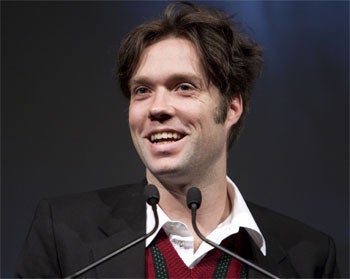Last Night's Television - Imagine...BBC1; True Stories: Maximum Prison, More4
More than a prima donna

"He was a flamboyant toddler," Loudon Wainwright III said about his son, recalling Rufus's childhood predilection for swanning about in his grandmother's apron. Loudon cocked an eyebrow as he said this, advertising an understatement, and almost immediately you found out why, as Imagine... played some of Rufus's childhood amateur movies, creations that appeared to owe more to Puccini and the films of Douglas Sirk than to George Lucas or Spielberg. When Rufus was sent off to boarding school, we learned, he adopted a cape and dressed as Salome, a commitment to the extravagantly camp that miraculously (perhaps because of Wainwright's uncloseted charisma) didn't result in bullying but in acceptance. From about the age of three onwards, it seems, he dedicated himself to living life as if it was a romantic opera, and now he's written one himself – payback, he said, for the many occasions on which opera has saved his life. With anyone else such a remark could be safely be discounted as florid exaggeration. With Wainwright you assumed that it somehow had a literal truth.
It doesn't always work like this. Some composers have lives of staid respectability and write churning dramas of transgression and fatal passion. But with Wainwright, the demarcation between art and life seems much fuzzier, almost comically so at times. "I knew at once that he was the love of my life," he said, remembering the first occasion he'd set eyes on his first boyfriend, "... and that it would not go well." He hadn't even spoken to him and the tragic plot-line was already sketched out. Other extravagances were far more dangerous. He seems to have been raped while cruising as a young boy in Hyde Park, and his commitment to LA's bohemian set resulted in a serious addiction to crystal meth, one he only kicked when he started to go blind. Now his addiction appears to be work, and as the son of two famously confessional singers – Loudon Wainwright and Kate McGarrigle – he's had a lifetime apprenticeship in converting private emotions into song: "I very much found out how they felt about each other on stage," he said, recalling the musical tit-for-tat that followed his parents' divorce.
Access to the rehearsals for Prima Donna suggested that it will be an unabashed homage to the 19th-century tradition, which fuelled Wainwright's early love of the form, untroubled by the 20th century's engrained suspicion of the hummable tune. Indeed, the composer said as much: "I do think that the power of melody is underestimated at the moment in all forms of music and it will rise again and opera is its main arsenal." Fans of Wainwright's throbbingly romantic pop – also illuminated by the film – will be looking forward to Friday's opening at the Manchester International Festival. Loudon Wainwright, on the other hand, drily predicted that there might be scepticism from fans of opera: "I don't know that world," he said, "... but I bet they're not a welcoming crowd – 'Oh look, the new Bizet is here! Come on in!'"
True Stories: Maximum Prison, a documentary about Angola prison in Lousiana, should have been unremittingly bleak given that 95 per cent of its 5,100 inmates expect to die within its walls. But Jonathan Stack's film, a 10-years-on sequel to an earlier film called The Farm, was unexpectedly uplifting. It began with an act of mercy – the granting of parole to a prisoner called Ashanti Witherspoon, sentenced to 75 years of hard labour in 1972, but eventually released after serving 35, in part because of the recommendation of Burl Cain, the warden who has wrestled Angola away from a regime of extreme brutality to one in which the idea of rehabilitation is not just a sick joke. Since Warden Cain arrived, violent incidents at the prison – once the most feared in the country – have dropped 75 per cent, a fact he attributes to a gentler interpretation of the institution's formal description as a correctional facility: "Correction...," he stressed, "correct deviant behaviour... not torture and torment."
Which doesn't mean that the American legal system doesn't put some obstacles in his way. Alongside Warden Cain's tough-minded humanity (he supervises executions, but holds the hands of condemned men as they die), you had the spectacle of Vincent Simmons's fruitless attempts to have his case reviewed – convicted of a double rape on the evidence of a victim who told the police that "all blacks look alike to me" and was then presented with a line-up in which Simmons was the only man wearing handcuffs. Stack didn't downplay the victims' experience of this crime and couldn't offer you any conclusive evidence as to whether Simmons had done it or not. But he successfully let you see how horrifying it might be, if you really were innocent, to have your continued protestations of that fact taken as proof of the viciousness of your character. And the film's conclusion – the overwhelmingly black prison population watching in tears as Obama was inaugurated in Washington – was genuinely moving.
Subscribe to Independent Premium to bookmark this article
Want to bookmark your favourite articles and stories to read or reference later? Start your Independent Premium subscription today.

Join our commenting forum
Join thought-provoking conversations, follow other Independent readers and see their replies